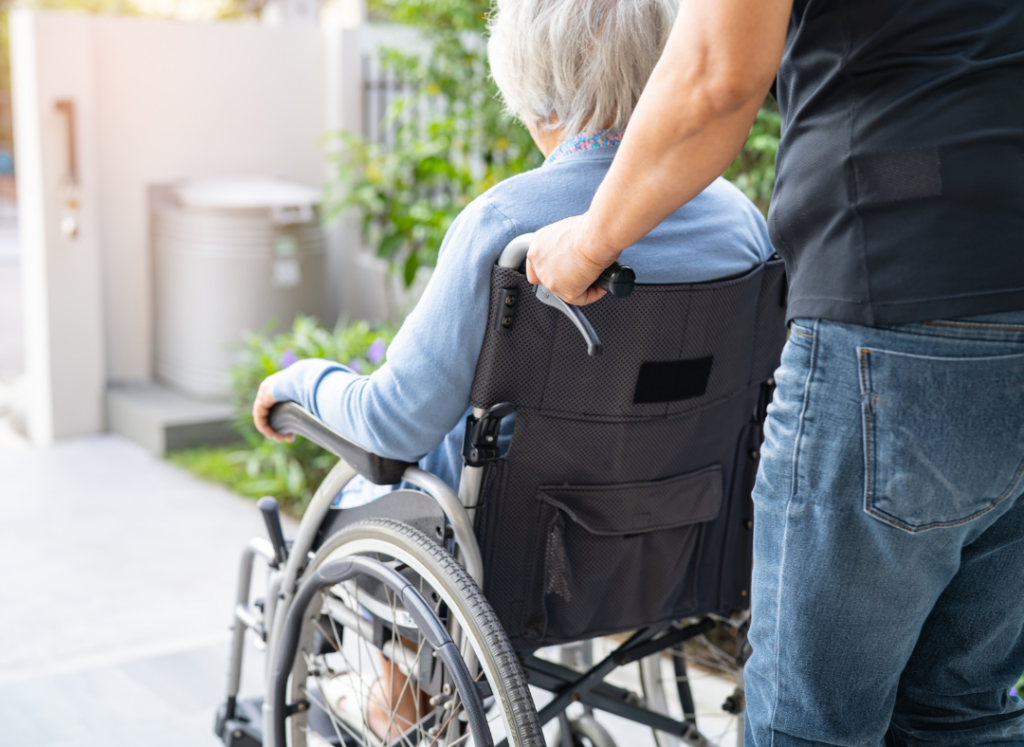In times when emergencies are more frequent and intense, being prepared is crucial, particularly for seniors, who encounter unique challenges in such situations. Highlighting the significance of emergency preparedness for older individuals, this blog outlines practical strategies for planning, response, and recovery to assist and ensure their safety and well-being when disaster strikes.
Seniors face specific vulnerabilities during emergencies, such as physical limitations, cognitive challenges, and social isolation, making it difficult for them to respond effectively. Thus, preparing for potential emergencies is crucial to safeguard their health and security.
Understanding Seniors’ Vulnerabilities
Physical Limitations
Seniors often face challenges related to mobility and health, which can impede their ability to respond effectively during emergencies. Conditions such as arthritis or limited mobility may hinder quick evacuation or accessing necessary emergency supplies themselves.
Cognitive Challenges
Cognitive impairments like dementia can complicate seniors’ understanding and affect the execution of emergency plans. Memory loss or confusion may delay their response or lead to difficulties following evacuation procedures.
Social Isolation
Many seniors live alone, increasing their vulnerability during emergencies. Social isolation can result in delayed assistance or communication, exacerbating the impact of the crisis. This highlights the importance of fostering strong social connections and community support networks for seniors.
Risk Assessment and Planning
Identifying Potential Hazards
Understand the specific risks seniors may face, such as natural disasters or power outages, and assess the potential impact on their well-being. This includes considering factors like location, health conditions, and mobility limitations.
Assessing Individual Needs
Conduct a thorough evaluation of individual needs, including medical requirements, mobility challenges, and communication preferences. This ensures that emergency plans are tailored to address these specific needs and vulnerabilities.
Creating Personalized Emergency Plans
Develop personalized emergency plans that outline clear procedures for evacuation, communication, and accessing essential supplies. These plans should be easy to understand and implement, taking into account the unique circumstances of each senior. Regular review and updates are essential to ensure that plans remain relevant and effective.
Building a Support Network
Engaging Family and Friends
Seniors derive significant support from their own network and social circle during emergencies. Whether it be older adult’s assistance with evacuation or simply providing emotional reassurance, the presence of family and friends can be invaluable.
Utilizing Community Resources
Local community resources, such as senior centers and neighborhood associations, offer additional layers of support. They can provide assistance with transportation, temporary shelter, and access to essential services, enhancing seniors’ ability to navigate through crisis situations.
Establishing Communication Channels
Maintaining open communication with family, caregivers, friends and neighbors is essential. Having reliable communication channels ensures that seniors can quickly reach out for assistance or updates, fostering a sense of security and connectedness during emergencies.
Creating a Safe Environment
Home Safety Measures
Implementing home safety measures is essential to prevent accidents and injuries during emergencies. Simple and easy steps, such as securing loose rugs, installing grab bars in bathrooms, and ensuring adequate lighting can significantly reduce the risk of falls and other mishaps.
Mobility and Accessibility Considerations
Seniors with limited mobility require special attention to ensure that their living environment is accessible and safe. This may involve making modifications such as installing ramps or stairlifts, removing obstacles that obstruct pathways, and ensuring that emergency exits are easily accessible.
Medication Management
Proper medication management is critical for seniors, especially during emergencies when access to healthcare services may be limited. Seniors should keep a sufficient supply of medications on hand, along with a list of prescriptions and dosages. It’s also important to have a plan in place for refilling prescriptions in case of emergency evacuation or disruption to regular doctor or pharmacy services.
Emergency Kit Essentials
Medications and Medical Supplies
Seniors should ensure they have an adequate supply of medications and essential other medical equipment and supplies in their emergency kit. This includes prescription medications, over-the-counter medications, and any necessary other medical devices or equipment such as insulin or oxygen tanks.
Food and Water
Stocking non-perishable food items and a sufficient supply of bottled water is essential for seniors during emergencies and disaster events. Choose foods that are easy to prepare and don’t require refrigeration or cooking, such as canned goods, granola bars, and dried fruits.
Important Documents and Contact Information
Seniors should keep copies of important documents in their emergency kit, including identification, insurance cards, medical records, and emergency contact list with information for family members, caregivers, and healthcare providers. Storing these documents in a waterproof container or protective sleeve will help prevent damage in case of flooding or water damage.
Evacuation Planning
Transportation Arrangements
Seniors should make transportation arrangements in advance to ensure they can evacuate safely in the event of an emergency. This may involve coordinating with family members, neighbors, or local transportation services to arrange transportation to a designated evacuation center or safe location.
Accessible Shelter Options
Seniors with mobility limitations should identify accessible shelter options in their area, such as shelters equipped with ramps, elevators, and accessible bathrooms. It’s important to research these options ahead of time and have a plan in place for reaching these shelters safely.
Assistance for Mobility-Impaired Seniors
Seniors with limited mobility may require assistance during evacuation. This may involve enlisting the help of family members, neighbors, or emergency first responders, to assist with transportation, carrying essential belongings, and navigating obstacles. It’s important to communicate any specific needs or requirements to ensure that appropriate assistance is available during evacuation.
Communication Strategies
Keeping Informed
Seniors must have access to reliable news sources and emergency alerts, ensuring they stay updated on evolving situations and response protocols. Regularly checking reputable websites and subscribing to local emergency alert systems can help seniors stay informed.
Utilizing Emergency Alerts and Notifications
Services like the Red Cross can provide timely notifications, including weather warnings, evacuation notices, and community updates. Seniors should familiarize themselves with these services and ensure they receive alerts through multiple channels, such as mobile phones and landlines.
Establishing Communication Protocols with Caregivers
Clear communication plans with caregivers and family members facilitate a coordinated response to medical information, ensuring prompt access to necessary assistance and support. Seniors should discuss communication preferences and emergency procedures with their caregivers to streamline information sharing during crises.
Response Strategies for Specific Emergencies
In response to specific emergencies, seniors should be proactive in their preparations. For natural disasters such as hurricanes and wildfires, it’s crucial for seniors to familiarize themselves with evacuation routes and secure essential supplies in advance.
Staying informed through weather alerts and updates ensures they can respond promptly to evolving situations. In the event of power outages and extreme weather events, seniors should have alternative power sources ready and dress appropriately to mitigate discomfort and health risks.
Additionally, for public health emergencies like outbreaks, seniors should diligently follow health guidelines, maintain good hygiene practices, and have a plan in place for accessing necessary medical care and resources to safeguard their well-being. By preparing ahead and staying informed, seniors can effectively navigate various emergency scenarios with greater resilience and safety.
Psychological Well-being and Support
Coping with Stress and Anxiety
Seniors should employ stress-relief techniques like deep breathing or meditation to manage anxiety during emergencies. Engaging the older adult in calming activities such as reading or listening to music can also help alleviate stress.
Addressing Trauma and Grief
Recognize the emotional impact of emergencies and seek support from loved ones or mental health professionals to process trauma and grief. Participating in a support network, groups or counseling sessions can provide valuable emotional support and coping strategies.
Seeking Professional Help
If feelings of anxiety or depression persist, seniors should not hesitate to seek professional help from therapists or counselors specializing in trauma and crisis intervention. It’s important to identify and prioritize a person for mental health and seek assistance when needed.
Training and Preparedness Exercises
Training and preparedness exercises are crucial for emergency readiness. Participating in drills and simulations familiarizes individuals with procedures, while regular plan reviews keep information current. Seeking training opportunities provides valuable skills to navigate crises effectively, ensuring better protection for all involved.
Financial Planning for Emergencies
Insurance Coverage Review
Regularly assess insurance policies to ensure adequate coverage for potential emergencies, such as home insurance for natural disasters or health insurance for serious medical conditions or emergencies.
Accessing Financial Assistance Programs
Research and familiarize yourself with available financial assistance programs, such as government aid or community resources, to help cover emergency expenses or losses.
Budgeting for Emergency Expenses
Establish a budget and set aside funds specifically designated for emergencies, allowing for the unexpected costs that may arise during crisis situations.
Long-Term Care Considerations
Alternative Living Arrangements
Explore options for alternative living arrangements, such as assisted living facilities or nursing homes, in case the need for long-term care arises during or after an emergency.
Accessing Senior Services and Supportive Housing
Familiarize yourself with senior services and supportive housing options available in your area, ensuring access to necessary assistance and resources in times of need.
Legal and Financial Planning
Engage in legal and financial planning to prepare for long-term care needs, including creating advance directives, establishing power of attorney, and setting up trusts or other financial arrangements to protect assets and ensure future care.
Role of Caregivers and Family Members
In times of emergencies, caregivers and family members play pivotal roles in ensuring the well-being of seniors. They provide essential support and assistance by aiding in evacuation procedures, coordinating necessary care, and offering emotional reassurance during challenging situations. It’s crucial for caregivers to fully understand their responsibilities, which include ensuring the safety of seniors, maintaining communication with healthcare providers, and advocating for their loved ones’ needs effectively.
Additionally, exploring respite care options enables caregivers to take breaks and prioritize their own well-being when necessary, ensuring they can continue providing optimal care and support over the long term. Through effective collaboration and understanding of roles, caregivers and family members can better navigate emergency situations while ensuring the comfort and safety of seniors under their care.
Summary of Key Points
Tailored emergency preparedness plans are essential for seniors, taking into account their unique needs and vulnerabilities. By customizing plans to accommodate factors like physical limitations, cognitive challenges, and social isolation, we can ensure their safety during crises. Encouraging proactive preparation, including risk assessment, personalized planning, and staying informed, empowers seniors to respond effectively to emergencies with confidence and resilience.









